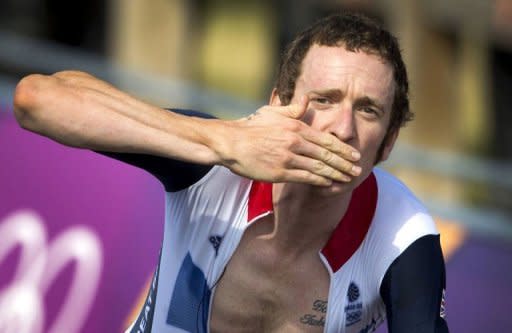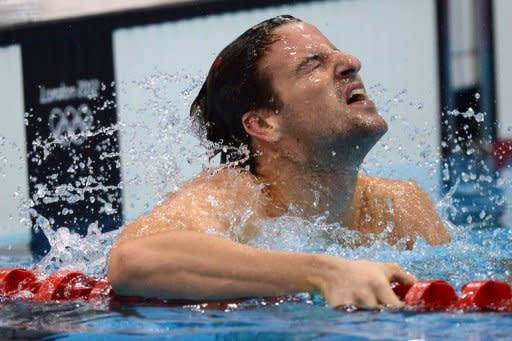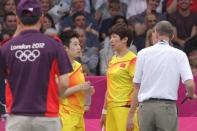Eight kicked out as badminton scandal rocks Games
Eight badminton players were disqualified from the Olympics after a scandal over "throwing" matches as British Tour de France winner Bradley Wiggins powered his way to cycling gold. Four pairs in the women's doubles competition -- one from China, one from Indonesia and two from South Korea -- were barred after being hit by disciplinary charges of the Badminton World Federation (BWF) took action. The BWF confirmed that the eight had been disqualified for trying to lose matches in the round robin phase to manipulate the knockout draw. A last-ditch appeals process was also rejected in the minutes leading up to the scheduled quarter-final start time. "The appeals committee chairman rejected the cases... the decision of the disciplinary commission stands," said BWF secretary-general Thomas Lund. The players at the heart of the scandal had been charged with "not using one's best efforts to win a match" and "conducting oneself in a manner that is clearly abusive or detrimental to the sport". They were allegedly attempting to manipulate the final standings in the first-round group stage, with two pairs who had already qualified apparently wanting to lose to secure a favourable draw in the next round. The eight are Chinese are top seed Yu Yang and Wang Xiaoli, South Korea's Ha Jung-Eun and Kim Min-Jung as well as Jung Kyung-Eun and Kim Ha-Na and Indonesian pair Meiliana Jauhari and Greysia Polii. One of the disqualified players, China's Yu, later announced she is quitting the sport, saying her dreams had been "heartlessly shattered". "This is my last time competing. Goodbye Badminton World Federation, goodbye my beloved badminton," she announced on her Weibo, or microblog, late on Wednesday. The Group A match at Wembley Arena between Chinese top seeds Yu Yang and Wang Xiaoli and unseeded South Korean pair Jung Kyung and Kim Ha-Na late Tuesday came under scrutiny by the BWF after the Chinese lost heavily. The longest rally in the match was just four shots. Their defeat meant Yu and Wang avoided playing fellow Chinese pair Tian Qing and Zhao Yunlei in the quarter-finals. London Olympics chairman Sebastian Coe described the scandal as "depressing" and "unacceptable", but officials said spectators who had paid to watch the farcical matches would not be refunded. "It's depressing," Coe said. "Who wants to sit through something like that? It is unacceptable." Leading badminton figures welcomed the disqualifications in a sport not known for its iron-handed discipline. "As a sportsman, that is really wrong," Charoen Wattanasin, executive board member of the BWF, and a Thailand Olympic Committee vice-president, told AFP. "Once you are on the court, like it or not, you have to try to win. That is why the spectators paid their money. "Sooner or later something had to be done. I see the motive. I feel sorry for what happened. I'm not condemning anyone. But the disciplinary committee had to do something." Away from the scandal, Great Britain finally opened their gold medal account with rowers Helen Glover and Heather Stanning roared to victory by a huge crowd at Eton Dorney to take gold in the women's pairs. But they were soon upstaged by Tour de France winner Wiggins, who became Britain's most successful Olympian with a resounding victory in the time trial race held in bright sunshine at Hampton Court, the former residence of King Henry VIII. Wiggins now has seven medals, one more than rower Steve Redgrave. American cyclist Kristin Armstrong claimed the women's title for a second successive Games while Qin Kai and Luo Yutong won the men's 3m synchronised springboard diving gold to make it four Chinese victories from four events. Later Wednesday, world champion swimmer James Magnussen goes for gold in the 100m freestyle, admitting he got the reality check he needed after Australia's humiliating flop in the 4x100m freestyle relay. The 21-year-old world champion nicknamed "The Missile" admitted he was on a steep learning curve at his first Games. "Everyone says it and I hear it so often, that the Olympics is a different pressure and I used to think 'yeah'... but it's true," he admitted.











